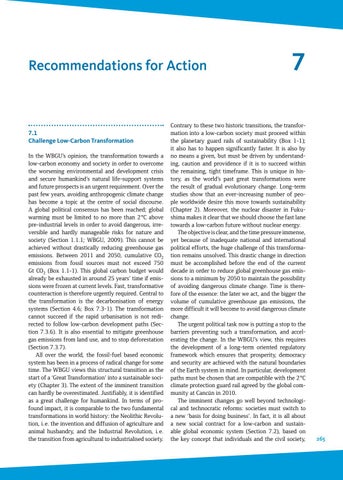Recommendations for Action
7.1 Challenge Low-Carbon Transformation In the WBGU’s opinion, the transformation towards a low-carbon economy and society in order to overcome the worsening environmental and development crisis and secure humankind’s natural life-support systems and future prospects is an urgent requirement. Over the past few years, avoiding anthropogenic climate change has become a topic at the centre of social discourse. A global political consensus has been reached; global warming must be limited to no more than 2 °C above pre-industrial levels in order to avoid dangerous, irre versible and hardly manageable risks for nature and society (Section 1.1.1; WBGU, 2009). This cannot be achieved without drastically reducing greenhouse gas emissions. Between 2011 and 2050, cumulative CO2 emissions from fossil sources must not exceed 750 Gt CO2 (Box 1.1-1). This global carbon budget would already be exhausted in around 25 years’ time if emis sions were frozen at current levels. Fast, transformative counteraction is therefore urgently required. Central to the transformation is the decarbonisation of energy systems (Section 4.6; Box 7.3‑1). The transformation cannot succeed if the rapid urbanisation is not redi rected to follow low-carbon development paths (Sec tion 7.3.6). It is also essential to mitigate greenhouse gas emissions from land use, and to stop deforestation (Section 7.3.7). All over the world, the fossil-fuel based economic system has been in a process of radical change for some time. The WBGU views this structural transition as the start of a ‘Great Transformation’ into a sustainable soci ety (Chapter 3). The extent of the imminent transition can hardly be overestimated. Justifiably, it is identified as a great challenge for humankind. In terms of pro found impact, it is comparable to the two fundamental transformations in world history: the Neolithic Revolu tion, i. e. the invention and diffusion of agriculture and animal husbandry, and the Industrial Revolution, i. e. the transition from agricultural to industrialised society.
7
Contrary to these two historic transitions, the transfor mation into a low-carbon society must proceed within the planetary guard rails of sustainability (Box 1-1); it also has to happen significantly faster. It is also by no means a given, but must be driven by understand ing, caution and providence if it is to succeed within the remaining, tight timeframe. This is unique in his tory, as the world’s past great transformations were the result of gradual evolutionary change. Long-term studies show that an ever-increasing number of peo ple worldwide desire this move towards sustainability (Chapter 2). Moreover, the nuclear disaster in Fuku shima makes it clear that we should choose the fast lane towards a low-carbon future without nuclear energy. The objective is clear, and the time pressure immense, yet because of inadequate national and international political efforts, the huge challenge of this transforma tion remains unsolved. This drastic change in direction must be accomplished before the end of the current decade in order to reduce global greenhouse gas emis sions to a minimum by 2050 to maintain the possibility of avoiding dangerous climate change. Time is there fore of the essence: the later we act, and the bigger the volume of cumulative greenhouse gas emissions, the more difficult it will become to avoid dangerous climate change. The urgent political task now is putting a stop to the barriers preventing such a transformation, and accel erating the change. In the WBGU’s view, this requires the development of a long-term oriented regulatory framework which ensures that prosperity, democracy and security are achieved with the natural boundaries of the Earth system in mind. In particular, development paths must be chosen that are compatible with the 2 °C climate protection guard rail agreed by the global com munity at Cancún in 2010. The imminent changes go well beyond technologi cal and technocratic reforms: societies must switch to a new ‘basis for doing business’. In fact, it is all about a new social contract for a low-carbon and sustain able global economic system (Section 7.2), based on the key concept that individuals and the civil society,
265
